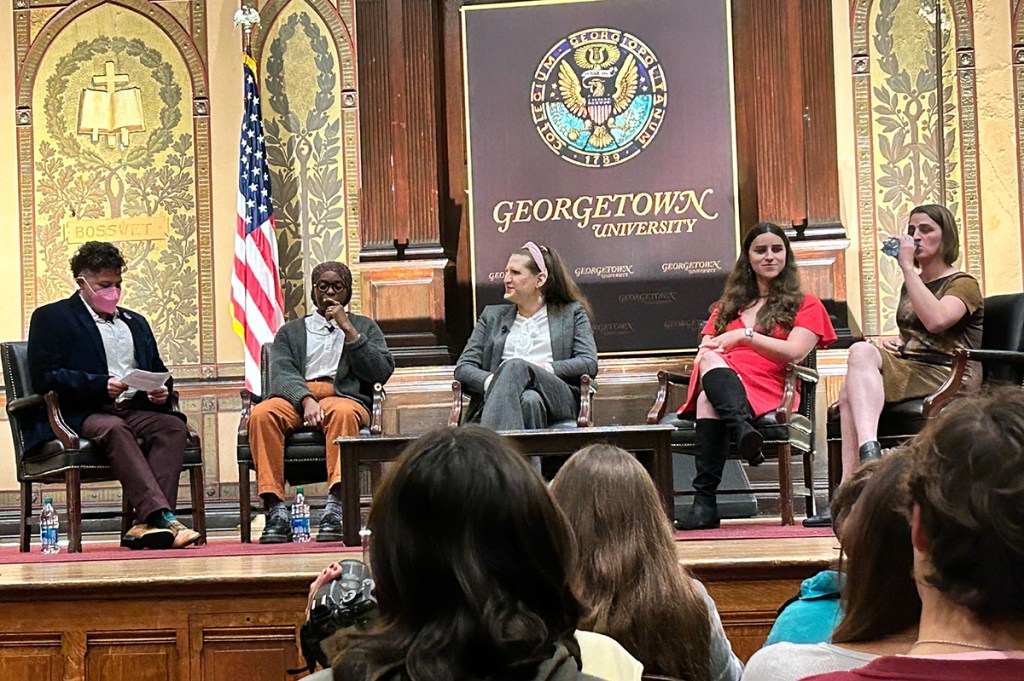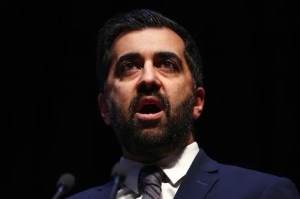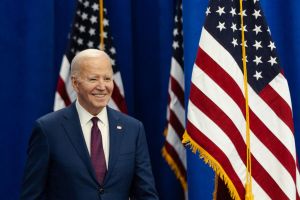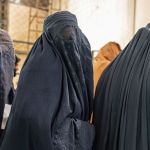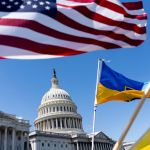It was a tale of two events Tuesday night at Georgetown University, the oldest “Catholic” university in the country and my alma mater.
Michael Knowles was set to speak about whether President Joe Biden is more evil than Putin and Xi in an event organized by the Georgetown University College Republicans (GUCR) and Young America’s Foundation (YAF). After GUCR announced the event, left-wing campus groups denounced Knowles due to his alleged transphobia (read: denying that people can — or should! — change their sex). I spoke to a couple of leaders for GUCR who told me they’d been on the receiving end of a lot of online vitriol and that flyers they put up for the event wouldn’t last for more than ten minutes before being ripped down.
I arrived at the event expecting a hearty protest. There were security guards dotting the walkway up to the entrance, a no-bag policy and attendees had to pass through a metal detector before getting inside. But the area was curiously bereft of jeering leftists. Instead, I was told that the College Democrats and GU Pride opted to host an alternative, competing event called “Trans Rights in America” across campus in the historic Gaston Hall. It was a panel event featuring transgender or nonbinary identifying people such as State Representatives Zooey Zephyr and Mauree Turner, Charlotte Clymer and Erin Reed.
I asked an organizer of the alternate event if it was set up specifically to draw attendance away from Knowles, and received a canned response: “Officially, this event has nothing to do with Michael Knowles.” The student also told me that the event was cosponsored by GU Politics, a university-run organization that is part of the McCourt School of Public Policy. I was unable to confirm this, but Clymer was previously a fellow with GU Politics and the supposedly nonpartisan group is run by a Democratic strategist, so it wouldn’t surprise me.
A College Democrat gave an opening address to the crowd in which he acknowledged that the event was being held on stolen land, and that Georgetown was built on slavery. I thought that sort of thing only happened in parodies of “woke” college students, but alas.
About 200 people were in attendance, and they cheered loudly for each panelist as they were introduced. They were completely unbothered by — perhaps even enamored with — the image of broad-shouldered, square-jawed men hulking across the stage in dresses. I can’t say I get the appeal.
The moderator, still wearing a mask in 2023, kicked off the panel by rattling off a list of “anti-trans” legislation being introduced around the country. The panelists seemed to agree that it was a dangerous time to be trans in America. Curiously, though, I noticed that there was a lone police officer required at the trans event, compared to the tight security protecting Knowles. The audience gave deafening applause to an announcement that this was the first panel at Georgetown that was made up entirely of trans or nonbinary-identifying people.
The panelists fretted about how just a few years ago, a trans bathroom bill in North Carolina failed miserably, and now they are ubiquitous. They chalked this up to savvy and insidious political posturing from groups like the Alliance Defending Freedom and the American Principles Project, and not from the fact that the more Americans become exposed to transgenderism and its ideology, the less they like it. They didn’t like being told to lie about whether someone is a man or a woman. They didn’t like being called transphobic for using the “wrong” pronouns or saying they wouldn’t date a man dressed as a woman. They especially didn’t like their kids being told it was normal, that their daughters had to give up their sports teams and locker rooms to biological men, that some parents were intentionally raising “genderless” children. They didn’t like that they had to assent to giving their children puberty blockers, hormones, and double mastectomies, else they might be taken away and become wards of the state. None of these things were a blip on the radar of the panelists. Anyone who disagreed with their position was bigoted or uneducated, of course.
The only mention of Knowles came from Clymer, who declined to name him outright and accused him of spreading disinformation. The science, Clymer insisted, was on the side of the men sitting on that stage in Gaston Hall.
That assertion was put to the test when Elad Eliahu, a reporter for Tim Pool’s podcast Timcast, stepped up during a Q&A session to ask, “What is a woman?”
The question almost didn’t get addressed at all, thanks to a student in line behind the reporter who tried to pull him away from the microphone, insisting it wasn’t the forum to ask something that might challenge the worldview of the presenters. Eliahu ignored her.
Clymer declined to answer directly, instead turning the question back around on Eliahu, who said it came down to “genetics.”
Clymer replied, “There are cisgender women with XY chromosomes, there are men with XX chromosomes, chromosomally [sic] we can’t determine what a woman is, biologically it’s very hard to define.”
Eliahu again asked if Clymer had a definition of a woman, to which Clymer admitted, “I don’t.”
At that point, several event organizers approached the microphone and demanded Eliahu leave the venue, which he did without incident.
Had I the chance to ask a question, my follow-up would have been, “If you can’t define what a woman is, then how do you know you are one?”
This fundamental conflict didn’t register with the adoring students, who used what little remained of the Q&A session to shower the panelists with praise for their bravery or request ways in which they can be better allies to the trans community.
Perhaps we forgot how crazy college students are in the past couple of years because they were mostly on Zoom courses, but last night confirmed to me that things have only gotten worse since pre-pandemic. I write a lot about my experiences at Georgetown in my book, The Snowflakes’ Revolt, and even in 2015-16 students approached political disagreements differently. The left on campus at that time was just a hostile, nasty and close-minded. However, many of them would still show up to speeches of people they disagree with, even if just to protest, ask “gotcha” questions or shake their heads in disapproval without actually hearing the other side.
Now, students seem totally unwilling to engage at all with opposing ideas. There’s something disturbingly cowardly about tearing down posters in the dead of night and hosting an alternate event where everyone affirms each other’s beliefs. I actually preferred it when my peers would threaten to come find me when I posted about my “scandalous” conservative ideas on Facebook. That at least requires some balls.
Perhaps this is another consequence of internet addiction and a lack of social ties among young adults these days. Kids and young adults never have to actually interact with people on the other side, and can insulate themselves in online communities that tell them everything they want to hear. It has provided a useful infrastructure for the unofficial echo chambers that long defined campus discourse. It’s also made young people softer than ever. It doesn’t seem like a coincidence that the increasingly right-on Gen Z is simultaneously the most mentally ill generation of youth in American history…
